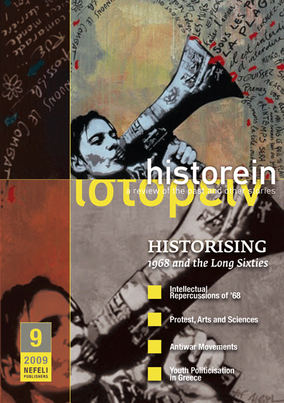Illuminating affects : Sexual violence as a crime against humanity. The Argentine case
Part of : Historein : a review of the past and other stories ; Vol.14, 2014, pages 22-42
Issue:
Pages:
22-42
Section Title:
Articles
Abstract:
This paper analyses testimonies of sexual violence provided in the context of the current trials in Argentina for crimes against humanity, in order to assess the role played by affects, both in historical representation and in the constitution of agency. Regarding these matters, it is important to stress that the concept of victimisation has been analyzed within the framework of gender theories in radical opposition to that of agency: the passiveness of the injury vis-à-vis the power of the action. It is my understanding that, throughout the analysis of what I call “metatestimonies”, meaning what victims express about their experiences of giving testimony, lies the possibility of challenging such a dichotomy. This is particularly the case when these metatestimonies are scrutinised under the scope of affects. My field research, based on interviews with testifiers and on observations of the trials, seeks to contradict observations that sustain that these testimonies victimise women twice by having them re-enact their trauma.
Subject:
Subject (LC):
Keywords:
Affects, Sexual violence, Gender, Testimony, Agency, Gender Studies
Notes:
Η περίληψη & τα keywords παρέχονται από πηγή εκτός τεκμηρίου
Electronic Resources:
References (16):
- Kwame Anthony Appiah, La ética de la identidad (Buenos Aires: Katz, 2007). Trans. Lilia Mosconi
- Elspeth Probyn, “Writing Shame”, in Melissa Gregg and Gregory Seigworth (eds), The Affect Theory Reader (Durham: Duke University Press, 2010)
- Sianne Ngai, Ugly Feelings, Cambridge: Harvard University Press, 2007.
- Lois McNay, “Feminism and Post-Identity Politics: The Problem of Agency”, in Constellations 17/4 (2010): 512–525.
- Lois McNay, Gender and Agency (London: Polity, 2000)
- Cecilia Macón, “Acerca de las pasiones públicas”, in: Deus Mortalis, No. 9, 2010, [261–286].
- Catherine Lutz, “Emotion, Thought, and Estrangement: Emotion as a Cultural Category”, in: Cultural Anthropology. Vol.1, No.3. August, 1986, [287–309].
- Heather Love, Feeling Backward. Loss and the Politics of Queer History, Cambridge: Harvard University Press, 2007.
- Ricardo Lorenzetti, R and Alfredo Kraut 2011, Derechos humanos:justicia y reparación. La experiencia de los juicios en la Argentina . (Buenos Aires: Sudamericana, 2011)
- Eléonore Lépinard, “Autonomy and the Crisis of the Feminist Subject” in: Constellations, vol.18, No.2, June 2011, 205–221.
- Dominick LaCapra, Writing History, Writing Trauma, (Baltimore and London: The Johns Hopkins University Press, 2001)
- Clare Hemmings, “Invoking affect: cultural theory and the ontological turn”, Cultural Studies 19/5 (2005): 548 –567. Clare Hemmings, Why Stories Matter (Durham: Duke University Press, 2011)
- Melissa Gregg and Gregory Seigworth (eds), The Affect Theory Reader, Durham and London: Duke University Press, 2010.
- Diana Coole, “Rethinking Agency: A Phenomenological Approach to Embodiment and Agentic Capacities”, in Political Studies 53 (2005): 124–142.
- Cathy Caruth, Unclaimed Experience, Baltimore: The John Hopkins University Press, 1996.
- Gabrielle Andreozzi, Juicios por crímenes de lesa humanidad en Argentina (Buenos Aires: Cara o ceca, 2011)




